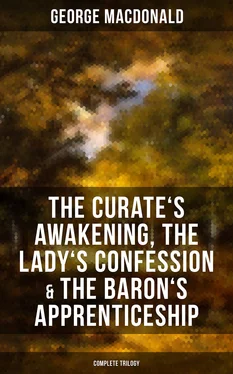Such were some of the curate's thoughts as he walked home, and they drove him to prayer, in which came more thoughts. When he reached his room he sat down at his table, and wove and knotted and pieced together the following verses, venturing that easy yet perilous thing, a sonnet. I give here its final shape, not its first or second:
Methought I floated sightless, nor did know That I had ears until I heard the cry As of a mighty man in agony: "How long, Lord, shall I lie thus foul and slow? The arrows of thy lightning through me go, And sting and torture me—yet here I lie A shapeless mass that scarce can mould a sigh." The darkness thinned; I saw a thing below, Like sheeted corpse, a knot at head and feet. Slow clomb the sun the mountains of the dead, And looked upon the world: the silence broke! A blinding struggle! then the thunderous beat Of great exulting pinions stroke on stroke! And from that world a mighty angel fled.
But upon the heels of the sonnet came, as was natural, according to the law of reaction, a fresh and more appalling, because more self-assertive and verisimilous invasion of the commonplace. What a foolish, unreal thing he had written! He caught up his hat and stick and hurried out, thinking to combat the demon better in the open air.
CHAPTER IX.
THE COMMON-PLACE.
Table of Contents
It was evening, and the air was still warm. Pine Street was almost empty, save of the red sun, which blinded him so that wherever he looked he could only see great sunblots. All but a few of the shops were closed, but amongst the few he was surprised to find that of his friend the linendraper, who had always been a strong advocate of early closing. The shutters were up, however, though the door stood wide open. He peeped in. To his sun-blinded eyes the shop looked very dark, but he thought he saw Mr. Drew talking to some one, and entered. He was right; it was the draper himself, and a poor woman with a child on one arm, and a print dress she had just bought on the other. The curate leaned against the counter, and waited until business should be over to address his friend.
"Is Mr. Drew an embryonic angel?" he half felt, half thought within himself. "Is this shop the chrysalis of a great psyche? Will the draper, with his round good-humoured face and puckering smile, ever spread thunderous wings and cleave the air up to the throne of God?"
"I cannot tell you how it goes against me to take that woman's money," said the voice of the draper.
The curate woke up in the presence of the unwinged, and saw that the woman had left the shop.
"I did let her have the print at cost-price," Mr. Drew went on, laughing merrily. "That was all I could venture on."
"Where was the danger?"
"Ah, you don't know so well as I do the good of having some difficulty in getting what you need! To ease the struggles of the poor, unless it be in sickness or absolute want, I have repeatedly proved to be a cruel kindness."
"Then you don't sell to the poor women at cost-price always?"
"No—only to the soldiers' wives. They have a very hard life of it, poor things!"
"That is your custom, then?"
"For the last ten years, but I don't let them know it."
"Is it for the soldiers' wives you keep your shop open so late? I thought you were the great supporter of early closing in Glaston," said the curate.
"I will tell you how it happened to-night," answered the draper, and as he spoke he turned round, not his long left ear upon the pivot of his skull, but his whole person upon the pivot of the counter—to misuse the word pivot with Wordsworth—and bolted the shop-door.
"After the young men had put up the shutters and were gone," he said, returning to the counter, "leaving me as usual to bolt the door, I fell a-thinking. Outside, the street was full of sunlight, but only enough came in to show how gloomy the place was without more of it, and the back of the shop was nearly dark. It was very still too—so still that the silence seemed to have taken the shape of gloom. Pardon me for talking in this unbusiness-like way: a man can't be a draper always; he must be foolish sometimes. Thirty years ago I used to read Tennyson. I believe I was amongst the earliest of his admirers."
"Foolish!" echoed Wingfold, thoughtfully.
"You see," the draper went on, "there IS something solemn in the quiet after business is over. Sometimes it's more so, sometimes less; but this night it came upon me that the shop felt like a chapel—had the very air of one somehow, and so I fell a thinking, and forgot to shut the door. How it began I don't know, but my past life came up to me, and I remembered how, when I was a young man, I used to despise my father's business, to which he was bringing me up, and feed my fancy with things belonging to higher walks in life. Then I saw that must have been partly how I fell into the mistake of marrying Mrs. Drew. She was the daughter of a doctor in our town, a widower. He was in poor health, and unable to make much of his practice, so that when he died she was left destitute, and for that reason alone, I do believe, accepted me. What followed you know: she went away with a man who used to travel for a large Manchester house. I have never heard of her since.
"After she left me, a sort of something which I think I may call the disease of self-preservation, laid hold upon me. I must acknowledge that the loss of my wife was not altogether a misery. She despised my trade, which drove me to defend it—and the more bitterly that I also despised it. There was therefore a good deal of strife between us. I did not make allowance enough for the descent she had made from a professional father to a trade-husband. I forgot that, if she was to blame for marrying me for bread, I was to blame for marrying her to enlarge myself with her superiority. After she was gone, I was aware of a not unwelcome calm in the house, and in the emptiness of that calm came the demon of selfishness sevenfold into my heart, and took up his abode with me. From that time I busied myself only about two things—the safety of my soul, and a good provision for my body. I joined the church I had occasion to mention to you before, sir, grew a little harder in my business dealings, and began to lay by money. And so, ever since, have I been going on till I heard your sermon the other day, which I hope has waked me up to something better.—All this long story is but to let you understand how I was feeling when that woman came into the shop. I told you how, in the dusk and the silence, it was as if I were in the chapel. I found myself half-listening for the organ. Then the verse of a hymn came into my mind—I can't tell where or when I had met with it, but it had stuck to me:
Let me stand ever at the door,
And keep it from the entering sin,
That so thy temple, walls and floor,
Be pure for thee to enter in.
"Now that, you see, is said of the temple of the heart; but somehow things went rather cross-cut that evening—they got muddled in my head. It seemed as if I was the door-keeper of my shop, and at the same time as if my shop, spreading out and dimly vanishing in the sacred gloom, was the temple of the Holy Ghost, out of which I had to keep the sin. And with the thought, a great awe fell upon me: could it be—might it not be that God was actually in the place?—that in the silence he was thinking—in the gloom he was knowing? I laid myself over the counter, with my face in my hands, and went on half thinking, half praying. All at once the desire arose burning in my heart: Would to God my house were in truth a holy place, haunted by his presence! 'And wherefore not?' rejoined something within me—heart or brain or something deeper than either. 'Is thy work unholy? Are thy deeds base? Is thy buying or selling dishonest? Is it all for thyself and nothing for thy fellows? Is it not a lawful calling? Is it, or is it not, of God? If it be of God, and yet he be not present, then surely thy lawful calling thou followest unlawfully." "So there I was—brought back to the old story. And I said to myself, 'God knows I want to follow it lawfully. Am I not even now seeking how to do so? But this, though true, did not satisfy me. To follow it lawfully—even in his sight—no longer seemed enough.—Was there then no possibility of raising it to dignity? Did the business of Zacchaeus remain, after the visit of Jesus, a contemptible one still? Could not mine be made Christian? Was there no corner in the temple where a man might buy and sell and not be driven out by the whip of small cords?—I heard a step in the shop, and lifting my head, saw a poor woman with a child in her arms. Annoyed at being found in that posture, like one drunk or in despair; annoyed also with myself for not having shut the door, with my usual first tendency to injustice a harsh word was trembling on my very lips, when suddenly something made me look round in a kind of maze on the dusky back shop. A moment more and I understood: God was waiting to see what truth was in my words. That is just how I felt it, and I hope I am not irreverent in saying so. Then I saw that the poor woman looked frightened—I suppose at my looks and gestures—perhaps she thought me out of my mind. I made haste and received her, and listened to her errand as if she had been a duchess—say rather an angel of God, for such I felt her in my heart to be. She wanted a bit of dark print with a particular kind of spot in it, which she had seen in the shop some months before, but had not been able to buy. I turned over everything we had, and was nearly in despair. At last, however, I found the very piece which had ever since haunted her fancy—just enough of it left for a dress! But all the time I sought it, I felt as if I were doing God service—or at least doing something he wanted me to do. It sounds almost ludicrous now, but—"
Читать дальше












